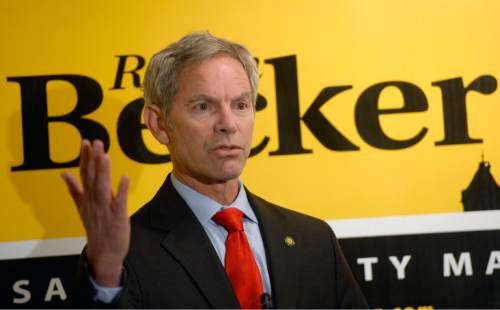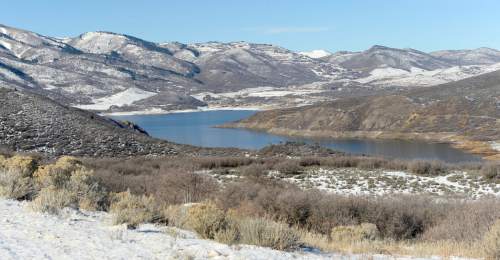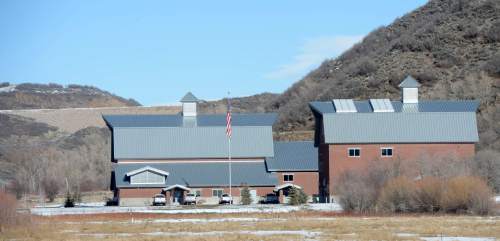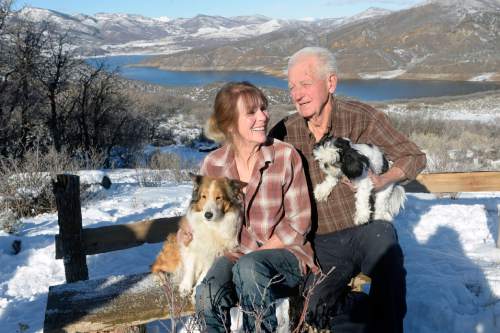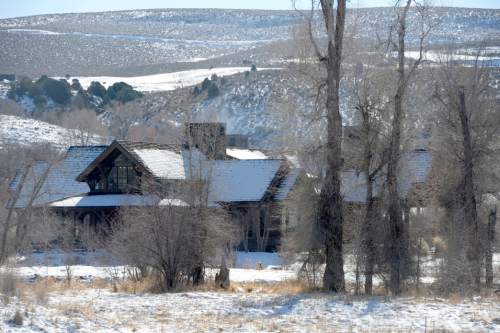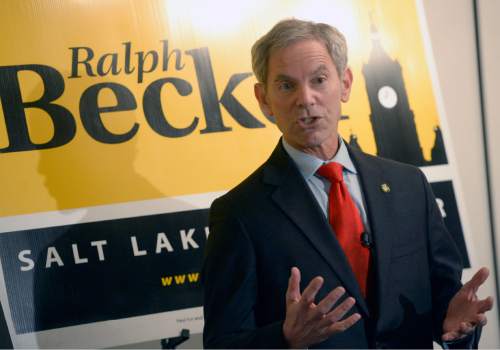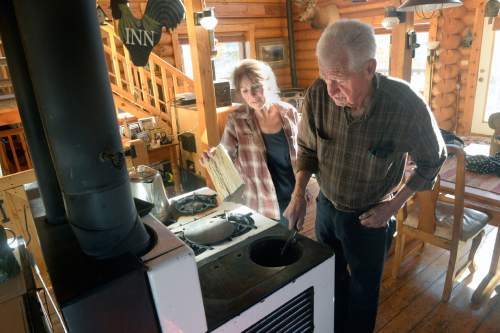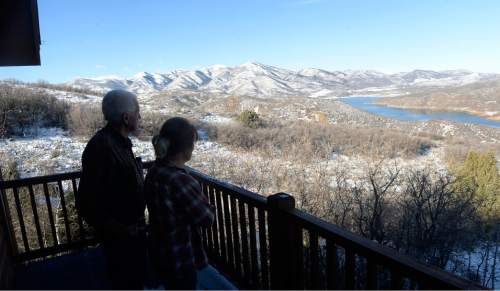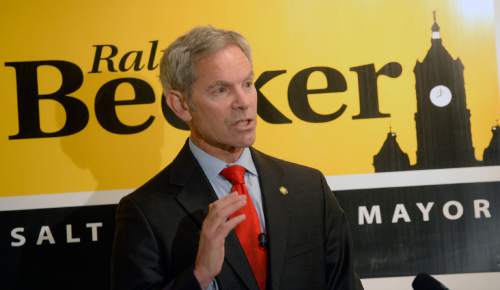This is an archived article that was published on sltrib.com in 2014, and information in the article may be outdated. It is provided only for personal research purposes and may not be reprinted.
Heber City • For four generations, David Cummings' family has grazed sheep on the hillsides above Heber City, at one time owning vast sections of the valley now submerged beneath Jordanelle Reservoir.
But now he has lost much of his family's land and has been forced to find new sheep pastures after the Jordanelle Special Service District levied millions of dollars in bond payments and water fees, then foreclosed on his property when he couldn't pay.
Cummings is one of several valley landowners who have been swept up in the foreclosures, unable or unwilling to make payments on $40 million in a sewage-treatment system that has never operated and won't be up and running in the foreseeable future. It is meant to serve about 3,300 homes that are still decades or more away from being built.
The Cummings family land — 200 acres of which have now been foreclosed upon — is just a sliver of a much larger issue that has pitted the special-service district against several big-time developers who claim their land, too, is being unfairly taken.
The long-running dispute has left the district with tens of millions of dollars in bills it can't pay, resulting in the first government-bond default in Utah history, according to a lawsuit by the banks holding the debt.
It has sparked numerous court battles, an investigation by the state auditor and the legislative auditor general, along with hearings and potential changes of state code by the Legislature.
In addition, FBI agents have begun interviewing potential witnesses regarding allegations of widespread mismanagement, misuse of public money and self-dealing, sources contacted by investigators told The Salt Lake Tribune.
To hear district officials tell the story in court filings and public hearings, it is a tale of landowners who made a bad business deal, leaving the district no choice but to foreclose. Now those landowners are hoping the courts and the Legislature intervene and let them walk away, leaving the district on the hook.
Landowners tell a different tale — one of an incompetent, or perhaps corrupt, government entity run amok.
—
Boom and bust • In the early 2000s, as luxury resorts and spacious homes were popping up all over the hills of Wasatch County, some developers approached the Jordanelle Special Service District, looking to build on the south side of the reservoir. But to make the project a reality, they would need access to sewage lines and treatment.
The district agreed to help with the financing, issuing $40.9 million in bonds in June 2009 to pay for a network of pipes and a treatment plant to handle the waste from the planned 3,300 homes in an area that included Victory Ranch, Talisman and the Cummings land.
But before the projects got off the ground, the real-estate market tanked. The bonds were issued at a 12 percent interest rate — extraordinarily high for government borrowing but, according to the district, the best it could get.
Much of the land changed hands through foreclosure or sale, but the new owners got something they say they hadn't bargained for — millions of dollars in liability for the inoperable sewage system.
One of those companies was BV Jordanelle, which had loaned money to another business that was hoping to develop the Talisman property. But the market crash doomed that project. After checking out the property, BV says, it foreclosed on the land, figuring it could sit on the sagebrush until the market rebounded.
But several months later, BV's executive, Cort Liddiard, said he got a bill from the district for millions in bond payments and for fees charged to reserve water from the district. Liddiard said he assumed it was a mistake, since the assessment hadn't shown up in the company's research, and there was no way he should have to pay water fees when there was no water running to the property.
"If I'm going to pay for utilities, I'd like them installed," Liddiard said. "I'd like to have access."
What BV and others were being billed for were actually "water-reservation fees," charges to have the district hold onto water in case it was someday needed to build the homes.
Interest and penalties tacked onto unpaid fees were astronomical.
For example, water-reservation fees for Cummings, the sheep rancher, started at just under $60,000 in 2012. When he didn't pay, the district added 6.5 percent, compounded monthly — an annualized percentage rate of about 113 percent, according to court records.
By 2013, Cummings owed $319,753. By April of this year, Jordanelle said Cummings owed more than $830,000 in penalties and water fees. He says he has his own water and never wanted or needed the district's.
Liddiard said it didn't seem right. Facing $500,000 in fees a year, with no demand for the water anywhere on the horizon and no way to deliver it to the property if he wanted it, something had to be done.
He met with Jordanelle officials, but there was no budging them: Pay the $2.1 million in assessments and water-reservation fees every year or Jordanelle would foreclose.
Jordanelle executives suggested an alternative, Liddiard said. BV could pay off the entire $40 million in bonds the district owed and then start picking up other parcels of land from other developers at "pennies on the dollar" once the district rolled in and foreclosed on them.
"I'd never seen this with a municipality," he said. "Holding us hostage would be a good way to describe it."
The deal stunk, Liddiard said, and BV ended up filing for bankruptcy and went to court to challenge Jordanelle's attempts to foreclose.
In the course of the legal battle, issues arose that attorneys say point to broad mismanagement and potential corruption on the part of the district.
—
Fishin' With Bread • Nestled in a small grove of trees, 100 yards from the road at the bottom of a hillside adjacent to one of Utah's most picturesque mountain ranges, sits what appears from the roadside to be a pair of good-sized barns.
Rather than a refuge for livestock, however, the barns are a state-of-the-art water-treatment plant that has already cost the Jordanelle Special Service District some $17 million despite the fact it has sat dormant.
The plant was supposed to be the centerpiece of the sewage system serving what someday would be a booming resort community. But without homes and hookups and pipes, there isn't enough waste to fire up the plant.
It has the capacity to serve 10,600 homes, more than three times the number developers planned to build there, and can't be operated until at least an estimated 350 homes are built. At current growth rates, that may take more than 50 years, according to court documents.
In the meantime, waste from the 15 homes that dot the hillside at Victory Ranch — mostly seasonal residences — is trucked past the state-of-the art plant to an older plant in Heber City.
The barns sit on a parcel that the district came to own through a questionable transaction unraveled by a forensic audit commissioned by landowners.
Since 2005, the district had owned a plot adjacent to where the treatment plant now sits, according to the audit by Gilbert & Stewart CPA. But it wasn't built there.
In 2006, a company called Fishin' With Bread LLC was created by a man named Chad Flinders, apparently to purchase a piece of property known as the Best Ranch. Dan Matthews, executive director of Jordanelle, signed documents assuring the bank that the service district would guarantee Fishin' With Bread's credit and the company bought the land for $2.5 million.
Within four days, Fishin' With Bread turned around and sold the land to the district for nearly $2.8 million.
The net result was that Fishin' With Bread — which took no risk on the deal because its credit was backed by the service district — flipped the land for a profit of more than $3,000 for every hour it owned the property.
In addition to the questionable land transaction, the landowners allege in their lawsuit that Jordanelle used more than $1.4 million that was supposed to go to improvements for their properties to build a massive water tank in another part of the valley and to improve a line that doesn't even service the properties in question.
The district would not answer questions from The Tribune regarding its dealings because of ongoing litigation, instead pointing the newspaper to court documents and public records. Steve Capson, a member of the Wasatch County Council, which oversees the district, told legislators last month that the district's board is united that it would take "swift action" if there were substantiated claims of mismanagement in the district.
"To date the board has not been presented with any substantiated evidence that affirms the claims of mismanagement and self-dealing," he said.
—
Cash cows • David Bryant is an attorney from Chicago, a place with a reputation for corruption. But he said he wasn't prepared for what he encountered when he persuaded some friends to buy Victory Ranch.
Shortly after the deal closed, Bryant claims, he was told by the prior ranch manager that he and his partners needed to go to the Wasatch County Fair and buy farm animals from local politicians' children.
"You need to get tens of thousands of dollars cash, because the county fair is coming up and you need to go buy farm animals from the county councilmen's kids as a way to grease the wheel," Bryant told legislators under oath at a recent hearing.
Bryant said he brushed off the suggestion as baseless gossip until the developer from whom his group had purchased the land confirmed this was the way things worked in Wasatch County. Bryant said the developer also told him he had paid to send a councilman's grandchildren to out-of-state rodeos.
Unlike the Cummings family, BV Jordanelle and others in the area, Bryant and his partners in Victory Ranch have paid more than $2 million a year to maintain their land while the lawsuit over assessments and water-reservation fees winds its way through the courts.
During the course of the lawsuits, a tape surfaced of a meeting between Matthews, Jordanelle's executive director, and several wealthy potential developers — including Josh Romney, son of 2012 Republican presidential nominee Mitt Romney.
In the course of the meeting, Matthews offered the developers a sweetheart deal: If they bought land the district had foreclosed upon, they could snatch up the valuable property for a song.
Matthews offered land all around Jordanelle Reservoir, according to a transcript of the tape, including some parcels that were in danger of slipping into arrears but on which the district had yet to foreclose. "Use me as the hammer," Matthews said, suggesting they let him drive out the current owners so they could scoop up the land.
Romney said he recalls the meeting, but not specific details. He owns land near Jordanelle Reservoir, but said the purchase wasn't related to the meeting with Matthews and the other developers. He said he didn't pursue any deal to acquire any of the land discussed after the meeting.
It is worth noting that, when Jordanelle put the foreclosed-upon property on the auction block, none of the developers bid on it. Nobody did, leaving the district as the owner.
Two of the three banks that bought the bonds sued the service district last month. USAA Mutual Funds Trust and Wells Fargo Bank accuse the district of acting in bad faith and mismanaging the money from the bonds, including by building an oversized, unusable treatment plant.
With most property owners refusing to pay assessments the district imposed to cover the bonds, Jordanelle has defaulted on its obligations — the first true government-bond default in Utah history, according to the lawsuit. And Jordanelle is now on the hook for 20 percent interest.
Recently the district, which doesn't want the land it now owns, sought to transfer it to the banks holding the bonds. But the banks, along with investor Koch Financial Corp., wanted no part of that transaction and tendered the property back, demanding instead that Jordanelle repay the remaining obligation plus interest, totaling about $50 million.
The Utah legislative auditor general started an audit of Jordanelle last year but that review is currently on hold. State Auditor John Dougall also is conducting an audit of the district. Within the past few months, FBI agents have been interviewing witnesses and others about Jordanelle's actions, part of an investigation into possible criminal acts.
And the dispute has spilled over into the Legislature. Both the Jordanelle district and the landowners have enlisted the help of numerous lobbyists — a total of nine currently working on both sides of the fight — to sway lawmakers.
Attorneys for Jordanelle have argued that the landowners realize they are losing in court and are going to the Legislature essentially to get a bailout, potentially sticking other ratepayers in the district with the tab.
Sen. Curt Bramble, R-Provo, is considering legislation to try to resolve the matter. He said his idea is to let the landowners form a new town, taking over the treatment plant and other assets as well as the debt owed by Jordanelle. They could then hook up other homes to the plant, charge impact fees and try to pay off the debts. But sustaining a town with just a handful of residents is problematic.
For Tracy Taylor, chairwoman of the Wasatch Taxpayers Association, one of the most troubling aspects is how little transparency there is into how the Jordanelle Special Service District operates and how little say taxpayers have in the operations.
"The [Wasatch County] taxpayers could possibly be held to pay all these legal fees for all this mismanagement," she said, "and yet we don't know half of what's going on up there," because of the closed meetings.
Taylor would like to see more openness from the district and, ultimately, for taxpayers to have a way to remove officials, including members of the County Council, from office.
Liddiard says his company could take the loss and walk away from the property. But it's become about more than that.
"Yeah, I don't want to lose the money, but it's not that big of a deal. But when you look into it and see the actions that were taken, it becomes a matter of right and wrong. I'd like to see some accountability," he said. "I'm in it up to here. I'm not going to stop until I have no other options."
gehrke@sltrib.com Twitter: @RobertGehrke



